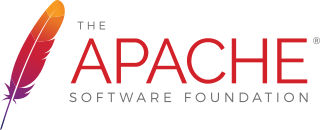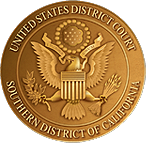
Open-source licenses are software licenses that allow content to be used, modified, and shared. They facilitate free and open-source software (FOSS) development. Intellectual property (IP) laws restrict the modification and sharing of creative works. Free and open-source licenses use these existing legal structures for an inverse purpose. They grant the recipient the rights to use the software, examine the source code, modify it, and distribute the modifications. These criteria are outlined in the Open Source Definition.
A lawsuit is a proceeding by one or more parties against one or more parties in a civil court of law. The archaic term "suit in law" is found in only a small number of laws still in effect today. The term "lawsuit" is used with respect to a civil action brought by a plaintiff who requests a legal remedy or equitable remedy from a court. The defendant is required to respond to the plaintiff's complaint or else risk default judgment. If the plaintiff is successful, judgment is entered in favor of the defendant. A variety of court orders may be issued in connection with or as part of the judgment to enforce a right, award damages or restitution, or impose a temporary or permanent injunction to prevent an act or compel an act. A declaratory judgment may be issued to prevent future legal disputes.

The Apache License is a permissive free software license written by the Apache Software Foundation (ASF). It allows users to use the software for any purpose, to distribute it, to modify it, and to distribute modified versions of the software under the terms of the license, without concern for royalties. The ASF and its projects release their software products under the Apache License. The license is also used by many non-ASF projects.

Apple Computer, Inc. v. Microsoft Corporation, 35 F.3d 1435, was a copyright infringement lawsuit in which Apple Computer, Inc. sought to prevent Microsoft and Hewlett-Packard from using visual graphical user interface (GUI) elements that were similar to those in Apple's Lisa and Macintosh operating systems. The court ruled that, "Apple cannot get patent-like protection for the idea of a graphical user interface, or the idea of a desktop metaphor [under copyright law]...". In the midst of the Apple v. Microsoft lawsuit, Xerox also sued Apple alleging that Mac's GUI was heavily based on Xerox's. The district court dismissed Xerox's claims without addressing whether Apple's GUI infringed Xerox's. Apple lost all claims in the Microsoft suit except for the ruling that the trash can icon and folder icons from Hewlett-Packard's NewWave windows application were infringing. The lawsuit was filed in 1988 and lasted four years; the decision was affirmed on appeal in 1994, and Apple's appeal to the U.S. Supreme Court was denied.

Patent infringement is the commission of a prohibited act with respect to a patented invention without permission from the patent holder. Permission may typically be granted in the form of a license. The definition of patent infringement may vary by jurisdiction, but it typically includes using or selling the patented invention. In many countries, a use is required to be commercial to constitute patent infringement.
The Private Securities Litigation Reform Act of 1995, Pub. L. 104–67 (text)(PDF), 109 Stat. 737 ("PSLRA") implemented several substantive changes in the United States that have affected certain cases brought under the federal securities laws, including changes related to pleading, discovery, liability, class representation, and awards fees and expenses.

In international law and business, patent trolling or patent hoarding is a categorical or pejorative term applied to a person or company that attempts to enforce patent rights against accused infringers far beyond the patent's actual value or contribution to the prior art, often through hardball legal tactics Patent trolls often do not manufacture products or supply services based upon the patents in question. However, some entities, which do not practice their asserted patent, may not be considered "patent trolls", when they license their patented technologies on reasonable terms in advance.
The multinational technology corporation Apple Inc. has been a participant in various legal proceedings and claims since it began operation and, like its competitors and peers, engages in litigation in its normal course of business for a variety of reasons. In particular, Apple is known for and promotes itself as actively and aggressively enforcing its intellectual property interests. From the 1980s to the present, Apple has been plaintiff or defendant in civil actions in the United States and other countries. Some of these actions have determined significant case law for the information technology industry and many have captured the attention of the public and media. Apple's litigation generally involves intellectual property disputes, but the company has also been a party in lawsuits that include antitrust claims, consumer actions, commercial unfair trade practice suits, defamation claims, and corporate espionage, among other matters.
The Educational Community License (ECL) is a free and open source license based on the Apache license and created with the specific needs of the academic community in mind.
DataTreasury, located in Plano, Texas, United States, develops, acquires and licenses technology for secure check image capture and storage. As of 2010 the company had 2 employees, about 1000 shareholders and had generated over $350 million in licensing revenue in the previous four years.

Alcatel-Lucent v. Microsoft Corp., also known as Lucent Technologies Inc. v. Gateway Inc., was a long-running patent infringement case between Alcatel-Lucent and Microsoft litigated in the United States District Court for the Southern District of California and appealed multiple times to the United States Court of Appeals for the Federal Circuit. Alcatel-Lucent was awarded $1.53 billion in a final verdict in August 2007 in the U.S. District Court for the Southern District of California in San Diego. The damages award was reversed on appeal in September 2009, and the case was returned for a separate trial on the amount of damages.
European patents are granted by the European Patent Office (EPO) under the legal provisions of the European Patent Convention (EPC). However, European patents are enforced at a national level, i.e. on a per-country basis, or, since June 1, 2023, before the Unified Patent Court (UPC). Under Article 64(3) EPC, "any infringement of a European patent shall be dealt with by national law," with the European Patent Office having no legal competence to deal with and to decide on patent infringements in the Contracting States to the EPC. A few, limited aspects relating to the infringement of European patents are however prescribed in the EPC.
A legal threat is a statement by a party that it intends to take legal action on another party, generally accompanied by a demand that the other party take an action demanded by the first party or refrain from taking or continuing actions objected to by the demanding party.
Defensive patent aggregation (DPA) is the practice of purchasing patents or patent rights to keep such patents out of the hands of entities that would assert them against operating companies. The opposite is offensive patent aggregation (OPA) which is the purchasing of patents in order to assert them against companies that would use the inventions protected by such patents and to grant licenses to these operating companies in return for licensing fees or royalties. OPA can be practiced by operating companies or non-practicing entities (NPEs)
Pleading in United States Federal courts is governed by the Federal Rules of Civil Procedure.

A copyright troll is a party that enforces copyrights it owns for purposes of making money through strategic litigation, in a manner considered unduly aggressive or opportunistic, sometimes without producing or licensing the works it owns for paid distribution. Critics object to the activity because they believe it does not encourage the production of creative works, but instead makes money through the inequities and unintended consequences of high statutory damages provisions in copyright laws intended to encourage creation of such works.

Microsoft Corp. v. Motorola Inc., 696 F.3d 872 was a United States Court of Appeals for the Ninth Circuit case about Reasonable and Non-Discriminatory (RAND) Licensing and foreign anti-suit injunction.
FTC v. Actavis, Inc., 570 U.S. 136 (2013), was a United States Supreme Court decision in which the Court held that the FTC could make an antitrust challenge under the rule of reason against a so-called pay-for-delay agreement, also referred to as a reverse payment patent settlement. Such an agreement is one in which a drug patentee pays another company, ordinarily a generic drug manufacturer, to stay out of the market, thus avoiding generic competition and a challenge to patent validity. The FTC sought to establish a rule that such agreements were presumptively illegal, but the Court ruled only that the FTC could bring a case under more general antitrust principles permitting a defendant to assert justifications for its actions under the rule of reason.

The Innovation Act of the 113th Congress is a bill that would change the rules and regulations surrounding patent infringement lawsuits in an attempt to reduce patent lawsuits.
Open source license litigation involves lawsuits surrounding open-source licensed software. Many of the legal rights of open source software licensors enforceable against users violating licensing agreements are untested by the U.S. legal system. Free and open source software (FOSS) is distributed under a variety of free-software licenses, which are unique among other software licenses. Legal action against open source licenses involves questions about their validity and enforceability.






